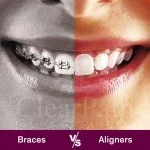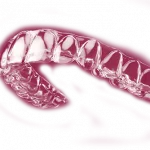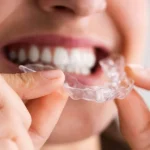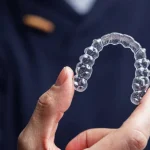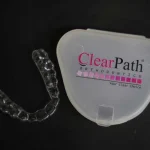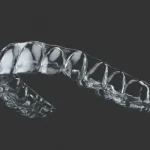In recent years, clear aligners have emerged as a popular alternative to traditional braces.
Their appeal lies in their discreet appearance and the flexibility they offer, making them a preferred choice for many individuals seeking orthodontic treatment.
However, using clear aligners comes with its own set of challenges, particularly when it comes to maintaining oral hygiene.
Unlike regular braces, clear aligners cover your teeth completely, which can make cleaning your teeth a bit tricky. This is where the orthodontic brush comes into play.
The Importance of Good Oral Hygiene with Clear Aligners
Maintaining good oral hygiene is crucial for everyone, but it becomes even more important when you’re undergoing orthodontic treatment with clear aligners.
The aligners cover your teeth for most of the day, which can trap food particles and lead to plaque buildup if not cleaned properly.
Challenges in Cleaning Teeth During Clear Aligner Treatment
Cleaning teeth during clear aligner treatment can be challenging.
The aligners need to be removed before eating or drinking anything other than water, and teeth must be cleaned before the aligners are put back in.
This can be inconvenient, especially when you’re outside or at work.
Introduction to Orthodontic Brushes
Orthodontic brushes are specially designed to clean around and between your teeth and aligners.
They come in various shapes and sizes to clean different areas of the mouth effectively.
Using an orthodontic brush can help keep your teeth and aligners clean, ensuring that your orthodontic treatment is as effective as possible.
Stay tuned for more information on how to use an orthodontic brush, the different types available, and tips for maintaining your oral hygiene during clear aligner treatment.
What Are Orthodontic Brushes? (And how are they different from regular toothbrushes?)

Orthodontic brushes are a type of toothbrush specifically designed for individuals undergoing orthodontic treatment, such as those using clear aligners or braces.
They have several unique features that set them apart from regular toothbrushes:
| What Makes Them Different From Regular Toothbrushes | Description |
| Smaller Brush Heads | Orthodontic brushes typically have smaller brush heads compared to regular brushes. This allows them to reach the undersides of the teeth and the areas around the aligners or braces, which can be difficult to clean with a regular toothbrush. |
| Soft Bristles | The bristles of an orthodontic brush are usually softer than those of a regular toothbrush. This is to ensure that they can gently clean the teeth and gums without damaging the aligners or braces. |
| Angled Bristles | Some orthodontic brushes also feature angled bristles. These are designed to provide better access to different tooth surfaces, making it easier to clean around the aligners or braces. |
Why Not Regular Tooth Brushes?
Regular toothbrushes might not be optimal for cleaning teeth with non-removable aligners because their larger size and harder bristles can make it difficult to clean around the aligners.
They may also potentially damage the aligners.
Therefore, using an orthodontic brush can be a more effective and safer option for maintaining oral hygiene during orthodontic treatment.
Benefits Of Using an Orthodontic Brush

Improved Plaque and Bacteria Removal
One of the main benefits of using an orthodontic brush is its ability to effectively remove plaque and bacteria.
The smaller brush heads and soft, angled bristles can easily reach under and around the fixed aligners, ensuring a thorough cleaning.
This reduces the risk of cavities and gum disease, which are common issues associated with poor oral hygiene during orthodontic treatment.
Enhanced Aligner Hygiene
Orthodontic brushes also play a crucial role in maintaining the hygiene of your aligners.
They can help keep your aligners free from food debris and stains, which not only prevents bad breath but also promotes aligner clarity.
This is particularly important for clear aligners, as their aesthetic appeal can be compromised by poor hygiene.
Gentle and Comfortable Cleaning
Orthodontic brushes are designed to provide a gentle and comfortable cleaning experience.
Their soft bristles are less likely to irritate the gums, making them an excellent choice for individuals with sensitive gums.
Moreover, the smaller brush heads allow for precise cleaning, ensuring that every part of your mouth is cleaned without causing discomfort.
Choosing the Right Orthodontic Brush

When it comes to choosing the right orthodontic brush, there are a few key factors to consider:
Brush Head Type
The size of the brush head is crucial. Opt for a brush with a small head that can easily navigate around the fixed aligners and reach all tooth surfaces.
A smaller brush head allows for more precise cleaning, ensuring that no area is missed during brushing.
Bristle Type
The type of bristles on the brush is another important factor.
- Soft bristles are recommended as they can prevent damage to the aligners and gently clean teeth and gums.
- Hard bristles can potentially scratch the aligners and irritate the gums, so it’s best to avoid them.
Additional Features
There are also additional features that you might want to consider based on your personal preferences and needs.
For instance, some orthodontic brushes come with angled bristles for better access to different tooth surfaces.
Others might include a tongue cleaner on the back of the brush head for comprehensive oral hygiene.
Remember, the best orthodontic brush is the one that fits comfortably in your mouth, reaches all areas effectively, and makes your oral hygiene routine easier.
How to Use an Orthodontic Brush
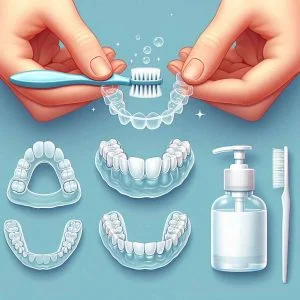
Brushing With Aligners On
Before inserting new aligners, it’s important to ensure that your teeth are clean.
It is better not to let food particles and bacteria from being trapped under the aligners, which could lead to cavities or gum disease.
To brush your teeth with the aligners on, gently brush small tooth surfaces with the orthodontic brush, ensuring the brush reaches under the fixed aligners.
The general prescription is to brush for at least 2 minutes twice a day to maintain optimal oral hygiene.
Brushing With Aligners Off
After removing the aligners for meals and snacks, it’s crucial to brush and floss your teeth.
This helps to remove any food particles that may have become lodged between your teeth and the aligners.
Follow the regular brushing and flossing techniques recommended by dental professionals.
This typically involves brushing all surfaces of each tooth and flossing between the teeth and along the gum line.
Cleaning the Orthodontic Brush
After use, rinse the orthodontic brush thoroughly under running water to remove any toothpaste or debris. Allow the brush to air dry in an upright position to prevent the growth of bacteria.
It’s advisable to replace the brush every 3 months or sooner if the bristles become frayed.
Using a worn-out brush can be less effective at cleaning your teeth and may even damage your aligners.
Orthodontic Brush Price in Pakistan
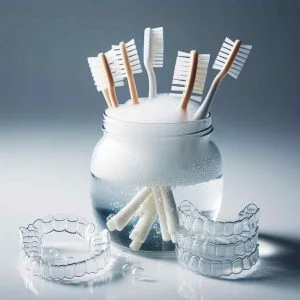
When it comes to purchasing an orthodontic brush in Pakistan, the price can vary depending on the type and brand of the brush.
Here are some examples:
- A standard Orthodontic Brush is available for around ₨ 200* – Rs 1500*.
- The Interdental Orthodontic Brushes are slightly more expensive, with prices around ₨ 400* to Rs 2000*.
*Please note that these prices are approximate and can vary based on the retailer and location.
It’s always a good idea to compare prices from different sellers to ensure you’re getting the best deal.
An Orthodontic Brush Kit?

An orthodontic brush kit is designed to provide a comprehensive solution for maintaining oral hygiene during orthodontic treatment.
Here’s what you can typically expect to find in an orthodontic brush kit:
| What is Included in an Orthodontic Brush Kit | Description |
| Orthodontic Toothbrush | The main component of the kit is the orthodontic toothbrush itself. This brush has a small head and soft bristles, making it ideal for cleaning around braces and aligners. |
| Interdental Brush | An interdental brush is a small brush designed to clean between your teeth and around your braces or aligners. It can reach areas that a regular toothbrush can’t, helping to prevent plaque buildup and gum disease. |
| Floss Threaders | Floss threaders are useful tools for threading dental floss under braces and between teeth. They make flossing easier and more effective during orthodontic treatment. |
| Dental Floss | Most kits also include dental floss. When used with a floss threader, it can effectively remove food particles and plaque from between your teeth. |
| Mouth Mirror | A mouth mirror can be helpful for checking hard-to-see areas in your mouth. It allows you to ensure that all areas of your teeth and braces are clean. |
| Travel Case | Finally, most orthodontic brush kits come with a travel case. This allows you to conveniently carry your oral hygiene tools with you, making it easier to maintain good oral hygiene habits wherever you go. |
Orthodontic brushes are an essential tool for maintaining optimal oral hygiene during clear aligner treatment.
Their unique design allows for effective cleaning around and under the aligners, ensuring that your teeth remain healthy throughout your orthodontic journey.
From improved plaque and bacteria removal to enhanced aligner hygiene and comfortable cleaning, the benefits of using an orthodontic brush are numerous.
However, it’s important to choose the right brush that suits your specific needs and to use it correctly for maximum effectiveness.
Remember, while this guide provides general advice, it’s always best to consult your orthodontist for personalized recommendations based on your specific needs and circumstances.
If you’re considering invisible braces to beautify your smile, please fill out our contact form.
We provide FDA-certified invisible braces in Pakistan and abroad. Our customer service team will assist you with the next steps while ensuring your privacy.

